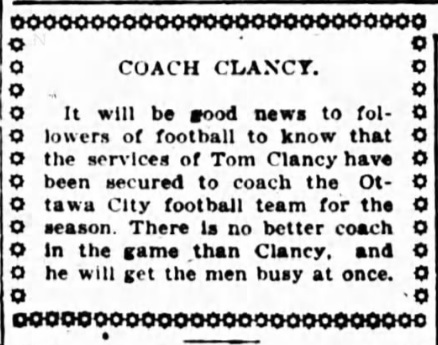We should know more about Tom Clancy not just because he was a successful, influential figure in the late 1800s and early 1900s but also because an important aspect of his career is often reported incorrectly.
Many lists of
Ottawa Rough Rider coaches name him as the team's coach starting from 1904. That does not actually appear to be the case and if not, then the win-loss record credited to him would also be wrong.
Let's work our way down his career and piece it all together. His obituary (he passed away in September of 1938) states that he joined
Ottawa College in 1892, apparently because he was drawn to their baseball team. He was considered an outstanding center and his U. of O. teams won national championships in 1894, 1896 and 1897. He planned to stop participating in 1898 but returned as a player-coach.
Ottawa Journal, October 18th, 1898: "The College (vs) Granite game next week should be a corker. Tom Clancy will practice and coach the college team every day this week."
His continued presence would have an inspirational impact on the team.
Ottawa Journal, October 24th, 1898:
He finally would pull the plug on his College playing days in late 1899.
Ottawa Journal, December 16th, 1899:
He was named President of the Rugby Football Union that year in 1901 but was back on the field by 1903. That year, Ottawa U. lost the championship game to the Rough Riders by a score of 13-12. Clancy played in that game for the garnet and grey, scoring a touchdown that was unconverted.
Clancy continued in his coaching role with Ottawa U. in 1904. He was only involved in Ottawa Rough Riders matches as a referee.
Then in 1907...
Ottawa Journal, October 2nd, 1907:
Ottawa Citizen, October 2nd, 1907:
He would hold the post through most of the 1911 season. He had planned to retire from the position in 1910 because he had been named president of the Big Four and did not want a conflict of interest but he was persuaded to return.
Beyond 1911, he contributed to the sport as an executive and as a referee. He was involved with the Rough Riders in 1919 but more as an assistant coach. He would, among other things, coach the intermediate team that the main club practiced against.
So official info appears to incorrectly indicate that he coached from 1904 to 1907 but they do it at the other end as well. It is said that Clancy coached the Rough Riders in 1921 and 1922 but that is difficult to support.
In 1921, the October 8th Citizen said that Clancy and Dave McCann were "directing their destinies in first-class shape" in reference to the Rough Riders. But in 1922, his coaching appears to have been as a substitute for Dave McCann. A practice report mentions Clancy's assistance but specifically named Walter Gilhooley as being in charge.
Ottawa Citizen, October 7th, 1922.
That isn't to take anything away from Clancy. He contributed to the game, and to Ottawa's place in it, in pretty well every conceivable manner for decades. For that matter, he was heavily involved in hockey, baseball and lacrosse as well locally.
So if Clancy didn't coach the Rough Riders from 1904 to 1906...who did?
Ottawa Journal, October 5th, 1904: "Bob Shillington coached the men and is confident with a few more practises (sic) the champions will be in good shape, and will not lose another game this season."
Ottawa Citizen, September 26th, 1905: "The Rough Riders had another turn out on the exhibition grounds yesterday afternoon when fully thirty-five men lined up under the coaching of Weldy Young."
Also in 1905:
Ottawa Citizen, September 29th, 1905:
Ottawa Citizen, September 20th, 1906: "The club will hold its first practice on Saturday afternoon at 3 o'clock and George Brown will handle the men this season."
Another article from early October 1906 names Dick Shillington as "assisting" with the coaching. I can't tell whether that is actually an erroneous reference to Bob Shillington above or another person altogether. What I do know is that don't see Clancy's name among the coaches.
So as a coach, Clancy might be given a little too much credit but overall his involvement in the sport is very much overlooked and perhaps overshadowed by the
hockey accomplishments of his son, Frank.
He may be responsible for one very significant part of Ottawa football history. The following is from Frank Cosentino's book "Canadian Football: The Grey Cup Years".
Tom "King" Clancy was the coach of the Ottawa team, and he, a former American who went to Ottawa College is credited with giving the Ottawas the name 'Rough Riders' because of his admiration for Teddy Roosevelt's famous military outfit of the same name.
I have my doubt about this. The Rough Riders name is traced back to 1898. Clancy was playing
against the Rough Riders for Ottawa College that year. It seems odd that he would bestow such a label to his opponents no matter how much he might respect them.
I think this paragraph in a recap of a game against Ottawa College is the cause of the confusion.
Someone named King
Kennedy rallied the troops and perhaps his nickname is causing him to be mistaken for King Clancy.
But that is only speculation on my part. I own one of Cosentino's book and there is no question that the man does his research. He would not make that claim lightly so it must be possible that Clancy is responsible for the Rough Riders name.





































